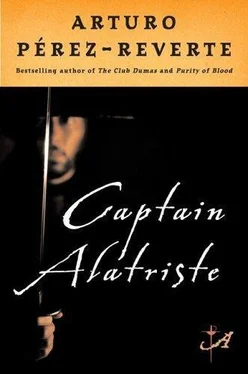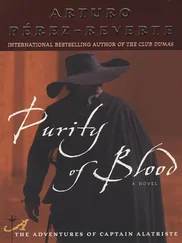Arturo Perez-Reverte - Captain Alatriste
Здесь есть возможность читать онлайн «Arturo Perez-Reverte - Captain Alatriste» весь текст электронной книги совершенно бесплатно (целиком полную версию без сокращений). В некоторых случаях можно слушать аудио, скачать через торрент в формате fb2 и присутствует краткое содержание. Жанр: Старинная литература, на английском языке. Описание произведения, (предисловие) а так же отзывы посетителей доступны на портале библиотеки ЛибКат.
- Название:Captain Alatriste
- Автор:
- Жанр:
- Год:неизвестен
- ISBN:нет данных
- Рейтинг книги:3 / 5. Голосов: 1
-
Избранное:Добавить в избранное
- Отзывы:
-
Ваша оценка:
- 60
- 1
- 2
- 3
- 4
- 5
Captain Alatriste: краткое содержание, описание и аннотация
Предлагаем к чтению аннотацию, описание, краткое содержание или предисловие (зависит от того, что написал сам автор книги «Captain Alatriste»). Если вы не нашли необходимую информацию о книге — напишите в комментариях, мы постараемся отыскать её.
Captain Alatriste — читать онлайн бесплатно полную книгу (весь текст) целиком
Ниже представлен текст книги, разбитый по страницам. Система сохранения места последней прочитанной страницы, позволяет с удобством читать онлайн бесплатно книгу «Captain Alatriste», без необходимости каждый раз заново искать на чём Вы остановились. Поставьте закладку, и сможете в любой момент перейти на страницу, на которой закончили чтение.
Интервал:
Закладка:
Their portly soon-to-be-employer was a man of few words. Again he waited without speaking, listening attentively as the round-headed one explained to Diego Alatriste and the Italian the final details of their assignment. Twice the portly man nodded, signaling his approval of what he heard. Then he turned and walked toward the door.
"I do not want much blood," they heard him insist for the last time from the doorway.
From everything he had seen—the man's bearing, and especially the profound respect the second masked man showed him—the captain deduced that the person who had just left was of very high station. Alatriste was still thinking about that when the round-headed fellow rested one hand on the table and stared intently at him and the Italian. There was a new and disquieting gleam in his eyes, as if he still had not told them everything. An uncomfortable silence fell over the shadow-filled room, and Alatriste and the Italian kept glancing at each other, wordlessly wondering what was yet to come. Facing them, motionless, the masked man seemed to be waiting for something, or someone.
The answer came after a moment, when a tapestry, inconspicuous in the shadows between the bookshelves, moved to reveal a hidden door; in the opening they could see a dark and sinister silhouette, which someone less level-headed than Diego Alatriste might have taken for an apparition. The newcomer stepped forward and the table lamp illuminated his face, exaggerating hollows in his shaved sunken cheeks and the feverish light in a pair of eyes shadowed by thick eyebrows. He was wearing the black and white robes of the Dominicans, and he was not masked. His shining eyes lent an expression of fanaticism to the thin, ascetic face. He must have been close to fifty years old. His gray, tonsured hair was cut short like a helmet around his temples, and his hands, which he had taken from the sleeves of his robes when he entered, were dry and bony, like those of a cadaver. They looked as if they would be as icy as death.
The round-headed man turned toward the priest with extreme deference. "You heard everything, Reverend Father?"
The Dominican nodded briefly, never taking his eyes from Alatriste and the Italian, as though appraising them. Then he turned to the masked man and, as if that movement were a signal or an order, the latter again addressed the two hired swords.
"The caballero who just left us," he said, "is worthy of every respect and consideration. But it is not he alone who decides this affair, and it is best that we elaborate on a few details."
When he reached this point, the masked man exchanged a brief look with the priest, awaiting his approval before continuing. But the other remained impassive.
"For reasons originating at the highest level of government," the masked man then continued, "and despite what the caballero who has just left said, the two Englishmen must be removed from contention in a more . . ." He paused, as if seeking the appropriate words. "... in a more, hmm, effective manner." Again he glanced at the priest. "That is, more definitive."
"Do you, senor, wish to say ..." began Diego Alatriste, who preferred to have things clear.
The Dominican, who had listened in silence and seemed to be growing impatient, interrupted, raising one of his bony hands.
"He 'wishes to say' that the two heretics must die."
"Both?"
"Both."
Beside Alatriste, the Italian again quietly whistled his little tune. Ti-ri-tu, ta-ta. His expression registered an emotion somewhere between interested and amused. The captain, slightly hesitant, looked at the money lying on the table. He thought a moment, then shrugged.
"No matter to me," he said. "And my companion seems not to object to the change in plans."
"I like it," the Italian said quickly, still smiling.
"It even makes things easier," Alatriste continued serenely. "At night it is more complicated to wound men than to dispatch them."
"The art of the simple," his companion added.
Now the captain looked at the masked man. "There is one thing that worries me," he said. "The caballero who just left seems to be a man of high caliber, and he said that he does not wish us to kill anyone. I do not know what my companion thinks, but I would prefer not to get on the wrong side of someone whom you yourself addressed as 'Excellency,' whoever he may be, in order to do Your Mercies' bidding."
"There could, perhaps, be more money," the masked one said, after a slight hesitation.
"It would be helpful to know exactly how much."
"Ten additional four-doubloon pieces. With the ten still to be paid, and these five, that will be twenty-five doubloons for each of you. Plus the purses of the most excellent Misters Thomas and John Smith."
"I am comfortable with that," said the Italian.
It was obvious that two or twenty made no difference to him: wounded, dead, or put up as pickles. As for Alatriste, he reflected again for a moment, then shook his head. That was a lot of doubloons for making sieves out of a pair of nobodies. And there, precisely, was the hitch in such a strange business: It was too well paid not to mean trouble. His instinct as a former soldier signaled danger.
"It isn't a question of money."
"There are swords to spare in Madrid," hinted the man with the mask, annoyed. The captain was not sure whether he meant in regard to looking for a substitute or for someone to settle scores if they refused the new arrangement. Alatriste was not pleased by the possibility that it was a threat. Out of habit, he twisted his mustache with his right hand as he slowly rested his left on the pommel of his sword. No one failed to register his move.
The priest whipped around to face Alatriste squarely. The ascetic's face had hardened, and his arrogant, sunken eyes bored into the captain's.
"I," he said in his disagreeable voice, "am Fray Emilio Bocanegra, president of the Holy Tribunal of the Inquisition."
With those words, an icy wind seemed to blow across the room. The priest made clear to Diego Alatriste and the Italian, succinctly, and menacingly, that he did not need a mask to hide his identity, or come to them like a thief in the night, because the power God had placed in his hands was sufficient to annihilate any enemy of the Holy Mother Church or His Catholic Majesty, the King of all the Spains. That said, while his listeners swallowed nervously, he paused to assess the effect of his words, then continued in the same threatening tone.
"Yours are sinful, mercenary hands, stained with blood like your swords and your consciences. But the Omnipotent Heavenly Father writes straight with crooked lines."
The crooked lines exchanged an uneasy glance as the priest continued. "Tonight," he said, "I am entrusting to you a task of sacred inspiration," and he added, "You are to fulfill it regardless of the cost, because in so doing you serve divine justice. If you refuse, if you cast aside the burden, the wrath of God will fall upon you through the long and terrible arm of the Holy Office. We are like muleteers. Ubiquitous and persistent."
With that the Dominican was silent, and no one dared speak a word. Even the Italian had forgotten his tra-la-las, and that said a lot.
In the Spain of that day, to quarrel with the powerful Inquisition meant to confront a series of horrors that often included prison, torture, the stake, and death. Even the toughest men trembled at the mention of the Holy Office, and for his part, Diego Alatriste, like all Madrid, knew very well the infamous reputation of Fray Emilio Bocanegra, president of the Council of Six Judges, whose influence reached as far as the Grand Inquisitor, and even the private corridors of the Royal Palace. Only a week before, because of a so-called crimen pessimum, Padre Bocanegra had convinced the tribunal to burn four young servants of the Conde de Monteprieto in the Plaza Mayor when, after being subjected to the Inquisitorial rack, they denounced each other as sodomites. As for the aristocratic count— himself a bachelor and a melancholy man—his title as a grandee of Spain had saved him from an identical fate by only a hair's breadth. The king contented himself with signing a decree to seize his possessions and send him into exile in Italy. The merciless Bocanegra had personally conducted the entire proceedings, and that triumph was the last step in securing his fearsome power at court. Even the Conde de Olivares, a favorite of the king, tried to please the ferocious Dominican.
Читать дальшеИнтервал:
Закладка:
Похожие книги на «Captain Alatriste»
Представляем Вашему вниманию похожие книги на «Captain Alatriste» списком для выбора. Мы отобрали схожую по названию и смыслу литературу в надежде предоставить читателям больше вариантов отыскать новые, интересные, ещё непрочитанные произведения.
Обсуждение, отзывы о книге «Captain Alatriste» и просто собственные мнения читателей. Оставьте ваши комментарии, напишите, что Вы думаете о произведении, его смысле или главных героях. Укажите что конкретно понравилось, а что нет, и почему Вы так считаете.










